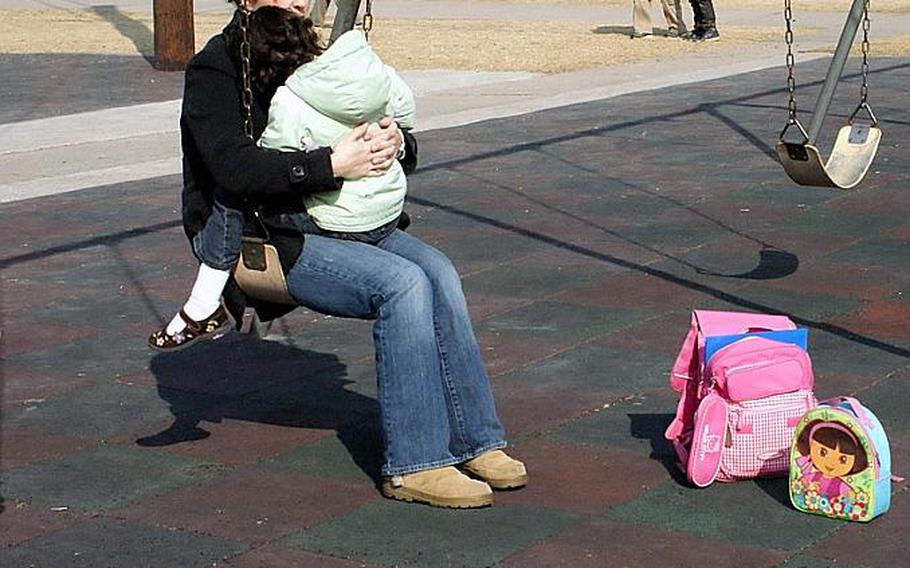
Laura Paterson and 5-year-old daughter Taylor are Army family members. U.S. Forces Korea commander Gen. Walter Sharp says he never considered recommending the evacuation of American civilians after North Korea's shelling of a South Korean island in November. (Alfredo Jimenez/Stars and Stripe)
SEOUL — The top U.S. commander in South Korea said he never considered recommending the evacuation of American civilians after North Korea’s shelling of a South Korean island in November.
Now, nearly three months after the attack, U.S. Forces Korea commander Gen. Walter Sharp said he believes the chances of a large-scale strike on the South -– and the need to evacuate military families because of an escalating threat — are still remote.
“I’m very comfortable with what we’re watching in North Korea,” he said, adding that if tensions did escalate to the point of conflict, the military could quickly move families off the peninsula.
However, he acknowledged that another isolated North Korean attack like the Nov. 23 bombing of Yeonpyeong Island, which left two civilians and two South Korean marines dead, is possible.
“Small, isolated incidents that they could do with little notice — I’m not going to be naïve and say that that’s not possible, because it is,” Sharp said during a recent interview with Stars and Stripes.
At U.S. Army Garrison-Yongsan in Seoul, the initial nervousness some felt after the unexpected attack on Yeonpyeong has largely subsided, and several troops described North Korea’s threats of war since then as saber-rattling.
“They’ve done crap in the past, and they never really go beyond that,” said Staff Sgt. Henry Stone, who lives in Seoul with his wife and child.
Tensions on the peninsula remain high following the Yeonpyeong attack and the sinking of a South Korean warship in March. North Korea also revealed a new uranium enrichment facility in November, indicating that its nuclear program may be more developed than previously thought. The Voice of America reported this week that North Korea has completed a launch tower at its second missile launch facility.
Sharp said he begins each morning with an intelligence briefing on North Korea, and would see “strong signals” if North Korea were preparing for an all-out attack on the South.
“What I’ve seen so far is North Korea is not preparing for an all-out attack,” he said. “What we saw in (Yeonpyeong Island) was very isolated to the northwest island area. There wasn’t anything else going on in North Korea that would have led us to believe that there was going to be an all-out attack.”
During an emergency, USFK would be responsible for military families and civilian workers, as well as evacuating about 140,000 private U.S. citizens working in South Korea and citizens of countries that make up the United Nations Command.
More military families will be stationed in South Korea in coming years under a command sponsorship plan that allows troops to serve two- and three-year tours in South Korea, instead of a traditional one-year unaccompanied tour. Under the plan, half of the 28,500 U.S. troops will eventually serve on command-sponsored tours, though only about 4,400 have command sponsorships today.
Despite the Yeonpyeong attack, demand for command-sponsored tours remains strong, with 939 troops on a waiting list for command sponsorships as of Jan. 21, according to USFK. Though an exact figure was not available, USFK spokesman David Oten said few, if any, troops have requested that their families be returned early to the U.S. since the Yeonpyeong attack.
Chief Warrant Officer 3 Monica Fergerson, stationed in South Korea since October 2009 with her two young children, said that despite North Korea’s constant threats, she had little concern until the Yeonpyeong bombing.
“They talked about it, but then the threat became real,” she said of North Korea. After a South Korean exercise in December was held without incident despite promises from the North and South to use force if needed, she felt secure again.
Her husband, 1st Lt. Tremain Fergerson, who transferred to Korea in December, said he was wary of having his family in South Korea in the days after the strike but believes the threat of escalation has passed.
“Then there was nothing else that followed so I was more relaxed, and think this was an isolated incident,” he said.
Spc. Ben Mitchell, whose lives in Seoul with his wife and three children, said he was somewhat worried immediately after the Yeonpyeong attack, and told his wife to make sure their evacuation packet – one with personal records every military family is supposed to have – was updated. After that, “we couldn’t do anything but wait,” he said.
Three attack-free months later, he doubts North Korea’s belligerence will go beyond verbal threats.
After 15 months in South Korea, Mitchell said he has adopted the attitude of his South Korean friends.
“It’s something that you kind of put on the back burner,” he said. “If something were to pop off tonight, I feel pretty confident that my family would get to safety.”
Sharp said whether the peninsula is safe for families is a “calculation that we look at constantly,” but “at the end of the day, the decision for a servicemember to bring his family over here or not is a family decision.”
For more Stars and Stripes coverage of the crisis in Korea, go to: http://www.stripes.com/news/special-reports/crisis-in-korea